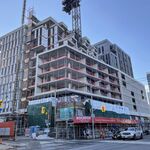If Council slowly congeals into Fordists and anti-Fordists, and maybe some kind of fluctuating mushy middle, I'll increasingly wonder how different the council would be if ridings and wards had been redistributed before this election. It's been a few years and the councillors no longer represent anything close to equal numbers of people. Many old Toronto wards are very small, barely half the size of some suburban wards, yet there are some small suburban wards, too, and some of the more central wards are large and growing.
It would have certainly shaken up the races, pitting incumbents against each other in spots and sprouting entirely new voting bases in others. Some, like Cho and Filion, would have had an easy time since the bulk of their old base would probably have stayed intact, but other incumbents would have been toast. It would be very interesting to see a continuum of councillors according to general leftness/rightness (not that such a list would be especially accurate, but three political spectrum blobs could probably work) combined with ward population. Would redistribution have made it easier for Ford to push a right-shifting agenda through Council? Would it have buffed up the left?
It would become a big issue if Ford somehow managed to slice the council in half...
Obviously making their money on concentrated demand, not expensive subways to sprawling suburbs (which include Vaughan).
Yes, that final 2km of the extension into Vaughan will totally sink the TTC. It will cost a billion dollars a year to operate and ridership will be zero, too. We could have ended the line at a UPS depot or we could have ended it at a huge planned development node and Viva line. Of course, even if we were lying and said we preferred the UPS depot, running to the development site and Viva line were the only options if we wanted the line extended at all.
Vaughan does get a bad rap. Visit Bathurst and then visit, well, anywhere in, say, Durham. Night and day. If the Megapolitan Centre gets built as planned, it could be impressive.
Do the MTR's finances specifically exclude bus lines, ferries, etc? The TTC's finances could be tweaked to show large profits if they didn't have to be burdened with the operating losses of all the surface routes. If only they could teleport buses...all those busy Steeles East buses that end up way out at the end could be zapped back in seconds instead of having to trudge back to Finch while picking up like 2 people.
Anyway, I doubt Ford will touch the low-performing bus routes any time soon. Just one angry, hard-working, tax-paying, howe-owning citizen appealing directly to Ford to keep a route could be enough for a crusade to be launched. It could be tricky for him to cut anything since doing so without causing such individual appeals seems unlikely, and such individual appeals drive Ford's traditional political ethos.




